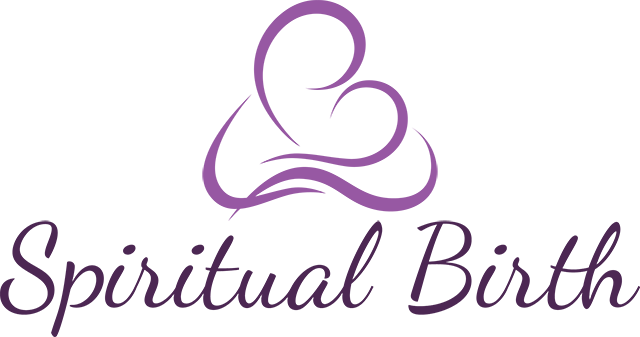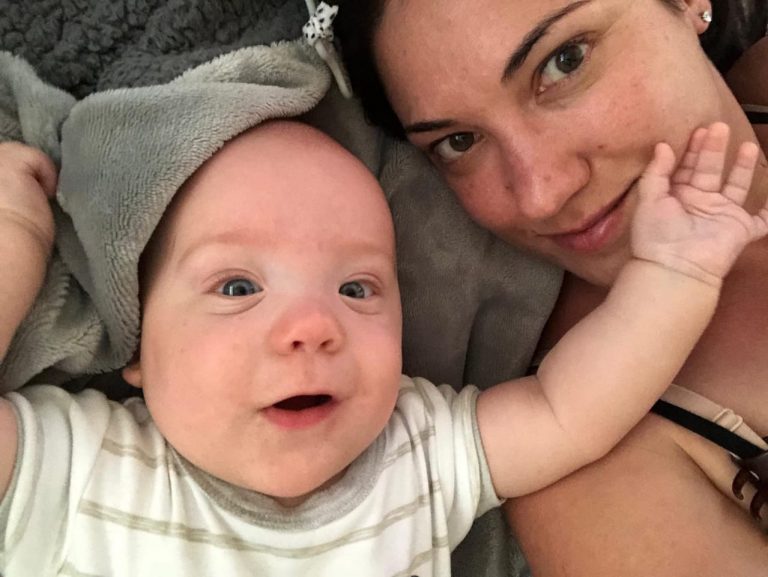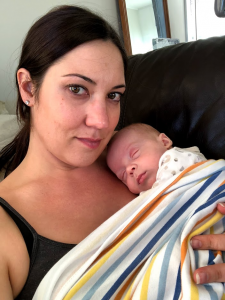Babies come into our world on earth as light as a bird on the wing with no material possessions, yet already possess patterns of behaviour and innate knowledge of how to get their needs met. Knowing how babies behave in the first three months after birth can help a new mother enjoy her baby.
Torrin, in the picture, was born 8 weeks early and needed a great deal of extra hospital care and kangaroo mother care from his mum Kathy.
As a midwife, maternity nurse and postnatal doula, I may spend up to three months with each mother and baby in the newborn period.
Secretly, I wish I had had a postnatal doula/maternity nurse when my children were born 35 years ago. Subsequently, after many years and hours of observation, I have learnt a few things about babies, and offer here a collection of the needs of babies:
1. Babies Need to be Held
Holding our babies on our bodies calms them and helps them to adjust to the sense of space in this physical world.
- They love to listen to an adult heartbeat when we position their ears on our chests.
- They enjoy the warmth of our bodies and this helps them to regulate their body temperature.
- Their breathing becomes more rhythmic and effective, giving their lungs and bodies much needed oxygen.
- Growth hormones are released. This has a positive effect on their physical growth, as well as peaceful sleep behaviour.
- In fact, holding a baby skin to skin(with any member of the family) improves their vital signs and helps them grow even more.
The warm loving feelings that holding your baby skin to skin can elicit, are an extra benefit and we all need those warm feelings in large doses as parents. This is because the love hormone oxytocin and other endorphins are released when we hold our babies skin to skin. Holding your baby skin to skin is called Kangaroo Mother Care. Maternity nurses and postnatal doulas can hold your baby when you are exhausted, not able, ill or need to do other things.
2. Babies Communicate
Babies communicate with us from before birth and need to be heard and understood. One of the ways they first express their language is the search for eye contact after birth. Newborn babies ‘crawl’ and lift their heads to search for the breast/food. This is their way of saying ‘Ah, you are the one whose voice I have been hearing in the womb’, ‘I am hungry’ or ‘I see you and want you to see me’.
- Babies need to feed and be nourished and they will let you know when they are hungry.
- Crying is the form of communication that precedes talking. Different tones and volume of crying mean different things. There is a cry for hunger, a different cry for discomfort, another sound for “I am tired”.
- Babies cry when they eliminate urine and stools from their bodies too. They do not like to be wet or dirty.
- Babies do not like to be too cold or too hot and will cry for assistance.
- Babies express joy by laughing, both joy, happiness and anger by kicking their legs.
- When hands and arms move it is usually in response to a conversation when an adult chats to them.
- Babies love to learn our language and if you watch carefully, when you hold eye contact and speak to a baby, their eyes will lock into yours and their hands and arms will move in synchrony to the sounds and syllables you are voicing. This is called entrainment.
3. Babies get Overwhelmed
Babies often feel overwhelmed and overstimulated by sounds, sights, smells, physical touch and by taste and the acts of swallowing, elimination, and temperature. This is why ensuring their physical comfort is important to their growth and development.
- In the beginning we need to protect babies from loud noises, sudden movements and strong smells. Their senses are acute and they are absorbing and trying to make sense of a great deal of information.
- Adults can easily overwhelm a baby by putting their faces too close to the baby’s face trying to encourage their social responses. A baby may show his feelings of being overwhelmed by looking away and staring into the distance.
- It’s polite to wait, to give baby some space and allow baby to initiate eye contact when he is ready. There is an ideal distance, approximately from an adult’s eyes to a bent arm (approximately 12 inches/30cms). Babies like calm playful adults and will play when they feel safe.
4. Each Baby is Unique
Each baby has a different constitution and character. This holds true even for babies in one family, not only for babies from different families. The genetic recipe of each baby is unique, and the behaviour of each baby in the early Wonder Weeks will be different.
- Some babies sleep well from the beginning. Other babies are “live wires” and like to be awake for longer than we expect.
- Your baby may need to eat more frequently and seem hungrier than others. A baby may prefer to sleep on a flat surface in the pram or cot or may need to be in arms or on your body.
- Babies have different levels of fussiness and will communicate with you by not settling or expressing their discontent by crying.
- Some babies may need to cry more, and others hardly cry at all. A crying baby may just need to be held (after you have checked the list of ‘comfort boxes’). Many babies are fussy in the early evening. If a baby cries unusually or incessantly it is recommended to check in with your doctor to rule out any illness. Equally, if your baby sleeps more than usual, check in with a doctor.
When you meet the needs of your babies, you are doing the best you can to help them adapt to their environment and to inner changes as they develop.
5. Babies need Stimulation
Some slightly older babies(from after 6 weeks) get bored easily and like to see new things daily.
- Hanging a mobile above the pram or cot may fascinate a baby from about 6 weeks onwards(and earlier). Other babies are happy to concentrate for a long time on one object.
- Babies love movement and like to be carried. They cannot use their arms and legs yet, so they like to use ours. They like to see the world as we go about our daily chores attached in a sling to our bodies or ‘on the arm’.
- Babies love to be spoken to and soon they are willing to have conversations with us. In fact, I have had conversations with babies from as early as 2 weeks, where they will respond to my voice with verbal tones of their own. Babies are absorbing information when they are included in our lives as we show them our world and how we live.
6. Babies need to be Soothed
Newborn babies love to be soothed. They like to be held and rocked in arms, or rocked in a rocking chair or carried around in slings close to our bodies. They like to sleep this way too. This helps them to develop their sense of motion (vestibular) and orient the different parts of their bodies. Babies like soothing sounds, some babies like ‘white noise’ and will sleep through anything. Other babies wake up at the slightest sound.
- Our job as parents is to set up an environment suited to your baby’s specific needs. Most babies love music, so lullabies and gentle songs are a hit. Some babies I have worked with just love some of the lighter opera songs.
- Babies love the ‘sotto’ voice and a slightly higher pitch when awake and listening.
- Voices express tenderness and love. Babies soon learn that coupled with a smile, a certain tone is welcoming, and they smile back.
7. Babies need to be Touched
Babies love being touched in gentle ways and massaged.
- Touching in light strokes and naming their body parts increases their body awareness.
- Massaging the body, arms legs, feet, hands, face and head of a baby also helps to develop their body awareness, as well as being calming and very satisfying for them.
- Babies do not like to be cold, so make sure the room and your hands are warm. Alternately, you can massage a baby through the clothes that he may need to wear to keep warm.
- A calm rhythmic firm yet gentle massage every day encourages eye contact and social responsiveness. If the baby is naked, almond oil with a few drops of lavender is safe to use.
- Dressing the baby after a massage and wrapping him/her in a soft blanket makes them feel cosy, and relaxed, often leading to the baby dropping off to sleep.
Newborn babies are little people with distinct needs and personalities. Meeting their needs makes it easier for them to adapt from the womb to the world. Mothers and fathers have needs too, similar to a baby’s needs in fact! This is where a postnatal doula, grandparents, maternity nurse, friends and family can step in and give a hand to share the task of ‘meeting the needs of babies’.


